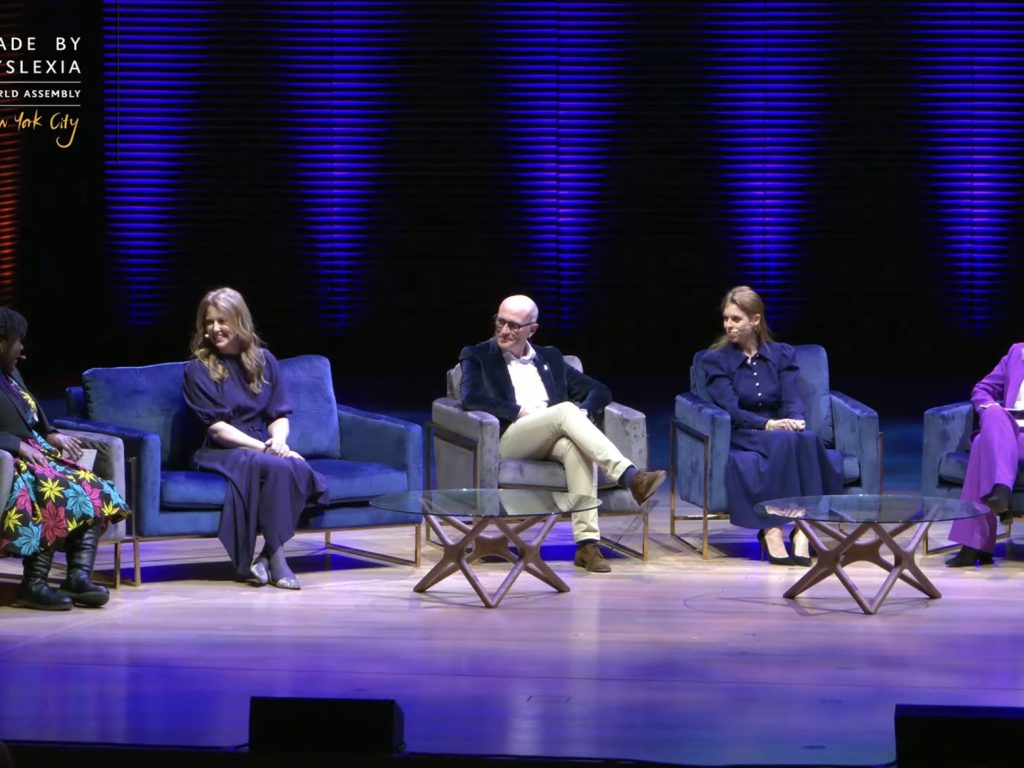Millfield Headmaster Gavin Horgan was a special guest at Made By Dyslexia’s second World Dyslexia
Assembly in New York City, this week.
Mr Horgan backs calls for systemic change to empower Dyslexic Thinking in every school and
workplace. Made By Dyslexia is a charity founded by Kate Griggs, a Millfield Governor and Old
Millfieldian, which is changing the way the world defines dyslexia.
He was joined on the live panel discussion by HRH Princess Beatrice, Deirdre Quarnstrom, VP of
Education Experiences at Microsoft and Space Scientist, Dr Maggie Aderin-Pocock, who all shared
their thoughts, insights and goals for the education systems of the future, at the Lincoln Centre, on
Monday 3 April.
New York is the first city in the world to pledge to train every teacher in specialist dyslexia skills. This
year’s guest list included New York City Mayor Eric Adams, Green Bay Packers player Rashan Gary
and Chopped Chef Marc Murphy.
At the assembly Mr Horgan said: “Millfield since 1935 has understood how to handle divergent
thinking and has done it very successfully. We do it with good training for all teachers, we recognise
that what’s good for dyslexic learners is good for all learners so if we teach in a way that supports
dyslexic learners actually everyone else in the classroom improves along the way, we also recognise
that children have brilliance in them and our job as educators is to help them find that
brilliance. We flex around the child rather than operating a cookie cutter model of education that
expects the child to conform to how we want to teach them.”
He also spoke positively about the use of AI in education. “We have a broken assessment system and
AI is going to force us to change that,” he said.
He went on to describe the ideal school: “The perfect school will be one that recognises the need for
personalised assessment, it will use AI in a completely empowering way so that all children can
access the curriculum in their own way. Current assessments measure schools and measure teachers
and that is not what they should do, they should give a child a sensible reflection on where they are
at in their journey.
“50% of the workforce needs to be retrained by 2025 (World Economic Forum) and the skills we
need typically are many of those dyslexic thinking skills so I would like to see direct connections from
schools, through to universities through to the world of employment.”
This is the second World Dyslexia Assembly that Mr Horgan has attended, having been a guest at the
event’s inauguration in Stockholm, Sweden last year.
Millfield is known for its proactive approach to learning support for children with dyslexia and it is no
coincidence that many former students go on to become innovators and entrepreneurs through
harnessing their ‘outside of the box’ thinking. Multiple students have gone on to achieve places at
top higher education institutions by learning ways to manage the challenges of their dyslexia and
embrace the positive skills it brings them.
The current examination system in England brands 65% of dyslexic learners as failures every year
when they do not pass GCSE English and Mathematics compared to only 29% of non-dyslexic
learners.
According to Made By Dyslexia, in schools, only one in five dyslexic children are identified with
dyslexia and only one in 10 teachers understand Dyslexic Thinking skills. In employment, less than
half of employers understand Dyslexic Thinking skills and four in five say recruitment is not geared
up for those with dyslexia.
Despite this, a report published by Made By Dyslexia and EY argued that in a fast-paced and
changing workplace, where machines are poised to take over many tasks, dyslexics have exactly the
skills needed for the workplace of tomorrow.
This was further emphasised by a report published with ManpowerGroup stating that the COVID-19
pandemic has turbo-charged this digitisation and by 2025 humans and machines will split work 50-
50, with 50 per cent of ‘human’ skills needed mapping directly with Dyslexic Thinking.
Acknowledging this, the world’s largest careers platform, LinkedIn, has added Dyslexic Thinking as a
skill which their 810+ million members globally can add to their profile. And dictionary.com are
adding the term to the dictionary.








